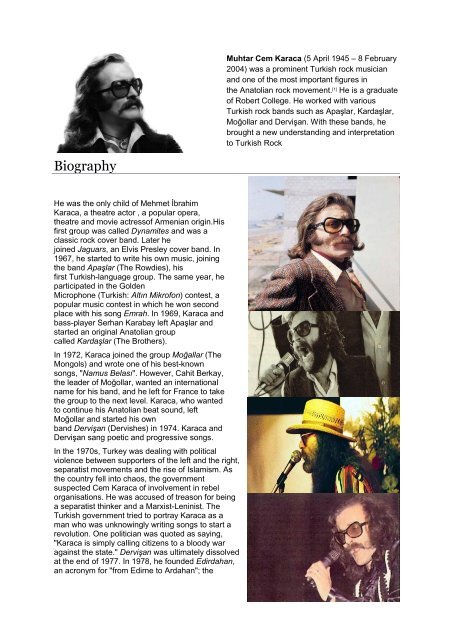You also want an ePaper? Increase the reach of your titles
YUMPU automatically turns print PDFs into web optimized ePapers that Google loves.
Muhtar Cem Karaca (5 April 1945 – 8 February<br />
2004) was a prominent Turkish rock musician<br />
and one of the most important figures in<br />
the Anatolian rock movement. [1] He is a graduate<br />
of Robert College. He worked with various<br />
Turkish rock bands such as Apaşlar, Kardaşlar,<br />
Moğollar and Dervişan. With these bands, he<br />
brought a new understanding and interpretation<br />
to Turkish Rock<br />
Biography<br />
He was the only child of Mehmet İbrahim<br />
Karaca, a theatre actor , a popular opera,<br />
theatre and movie actressof Armenian origin.His<br />
first group was called Dynamites and was a<br />
classic rock cover band. Later he<br />
joined Jaguars, an Elvis Presley cover band. In<br />
1967, he st<strong>art</strong>ed to write his own music, joining<br />
the band Apaşlar (The Rowdies), his<br />
first Turkish-language group. The same year, he<br />
p<strong>art</strong>icipated in the Golden<br />
Microphone (Turkish: Altın Mikrofon) contest, a<br />
popular music contest in which he won second<br />
place with his song Emrah. In 1969, Karaca and<br />
bass-player Serhan Karabay left Apaşlar and<br />
st<strong>art</strong>ed an original Anatolian group<br />
called Kardaşlar (The Brothers).<br />
In 1972, Karaca joined the group Moğallar (The<br />
Mongols) and wrote one of his best-known<br />
songs, "Namus Belası". However, Cahit Berkay,<br />
the leader of Moğollar, wanted an international<br />
name for his band, and he left for France to take<br />
the group to the next level. Karaca, who wanted<br />
to continue his Anatolian beat sound, left<br />
Moğollar and st<strong>art</strong>ed his own<br />
band Dervişan (Dervishes) in 1974. Karaca and<br />
Dervişan sang poetic and progressive songs.<br />
In the 1970s, Turkey was dealing with political<br />
violence between supporters of the left and the right,<br />
separatist movements and the rise of Islamism. As<br />
the country fell into chaos, the government<br />
suspected Cem Karaca of involvement in rebel<br />
organisations. He was accused of treason for being<br />
a separatist thinker and a Marxist-Leninist. The<br />
Turkish government tried to portray Karaca as a<br />
man who was unknowingly writing songs to st<strong>art</strong> a<br />
revolution. One politician was quoted as saying,<br />
"Karaca is simply calling citizens to a bloody war<br />
against the state." Dervişan was ultimately dissolved<br />
at the end of 1977. In 1978, he founded Edirdahan,<br />
an acronym for "from Edirne to Ardahan"; the


